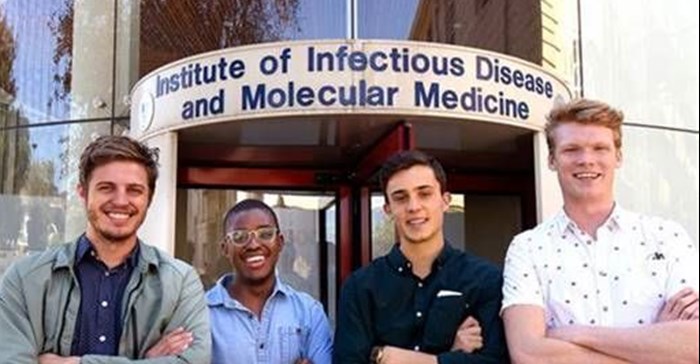A new initiative by the University of Cape Town's (UCT) Surgical Society is offering students from across faculties the opportunity to join forces to help plot a new course for South Africa's healthcare system. As part of the initiative, students come up with innovative solutions to some of the deeply-entrenched systemic problems.

Nick Loxton, president of the UCT Surgical Society (left,) with (from second left) Sipho Ndereya, Matthew Potter and Liam Devenish, who are heading up the project.
The intersectoral initiative comes at a time when global healthcare is faced with a growing disease burden, economic volatility and the potential of people living past 200 years of age.
Headed up by Liam Devenish, fourth-year MBChB/MSc; Sipho Ndereya, fourth-year MBChB and Matthew Potter, final-year MBChB, the Futures in Health Accelerator Project takes the form of a student-run incubator that will assist multi-disciplinary student teams to develop and nurture disruptive ideas that ultimately have the potential to improve healthcare in South Africa.
Design thinking
“The idea is that we upskill students in a variety of different disciplines with design thinking as the backbone, and then equip them further with certain deep dives in areas that are essential to health innovation,” explains Devenish.
Central to the programme is the concept of intersectoral collaboration – bringing together students from diverse backgrounds to foster change by working as teams. As their website’s “about” page reads: “The buzz words here are multi-disciplinary and intersectoral collaboration: the more diverse your team, the better your chances of developing something with a wide impact on the ecosystem.”
Ndereya says they want participants from all faculties “because it’s really about having people who are interested in enacting change. So, whatever your background is, doesn’t really matter because everyone is going to be out of their comfort zone at some point in the project.”
Devenish, Ndereya and Potter concentrated their recruitment efforts on several UCT societies whose members are already interested in some of the specific issues the programme will address. These include the UCT Cardiac Society, Internal Medical Society, Psychiatry Society, Pre-Clinical Society, InvestSoc and the Consulting Club.
Interested parties were directed to a four-step application process, which included gathering a team and completing a one-page response to a specific healthcare challenge.
The official project launch will take place on Tuesday, 7 May 2019. During this event, the selected teams will be introduced to some of the key people they will be interacting with throughout.
Creating a platform
Once a sound foundation has been laid, teams will be given access to facilities and coaches to help them iterate meaningful solutions to the problem. These could be anything from creating a digital health platform to setting up a proposal for a start-up company.
At the end of the project, teams will have the opportunity to showcase their work at a final capstone event, where they will pitch to healthcare academics from UCT, policymakers from the Western Cape Department of Health and would-be investors from larger Cape Town-based incubators.
“It’s very easy to come up with a great idea, but how do you access the right channels to get it out there? This programme will hopefully offer teams a platform for meeting the right people and making useful contacts to take their ideas forward,” Potter says.
Nick Loxton, president of the UCT Surgical Society, expresses their excitement about the programme, saying that it offers a unique opportunity to engage with students who aren’t in the healthcare field, but who want to help make a difference. “Futures in Health is a great way to empower students to do something that really makes a massive change in society as a whole,” he says.



























